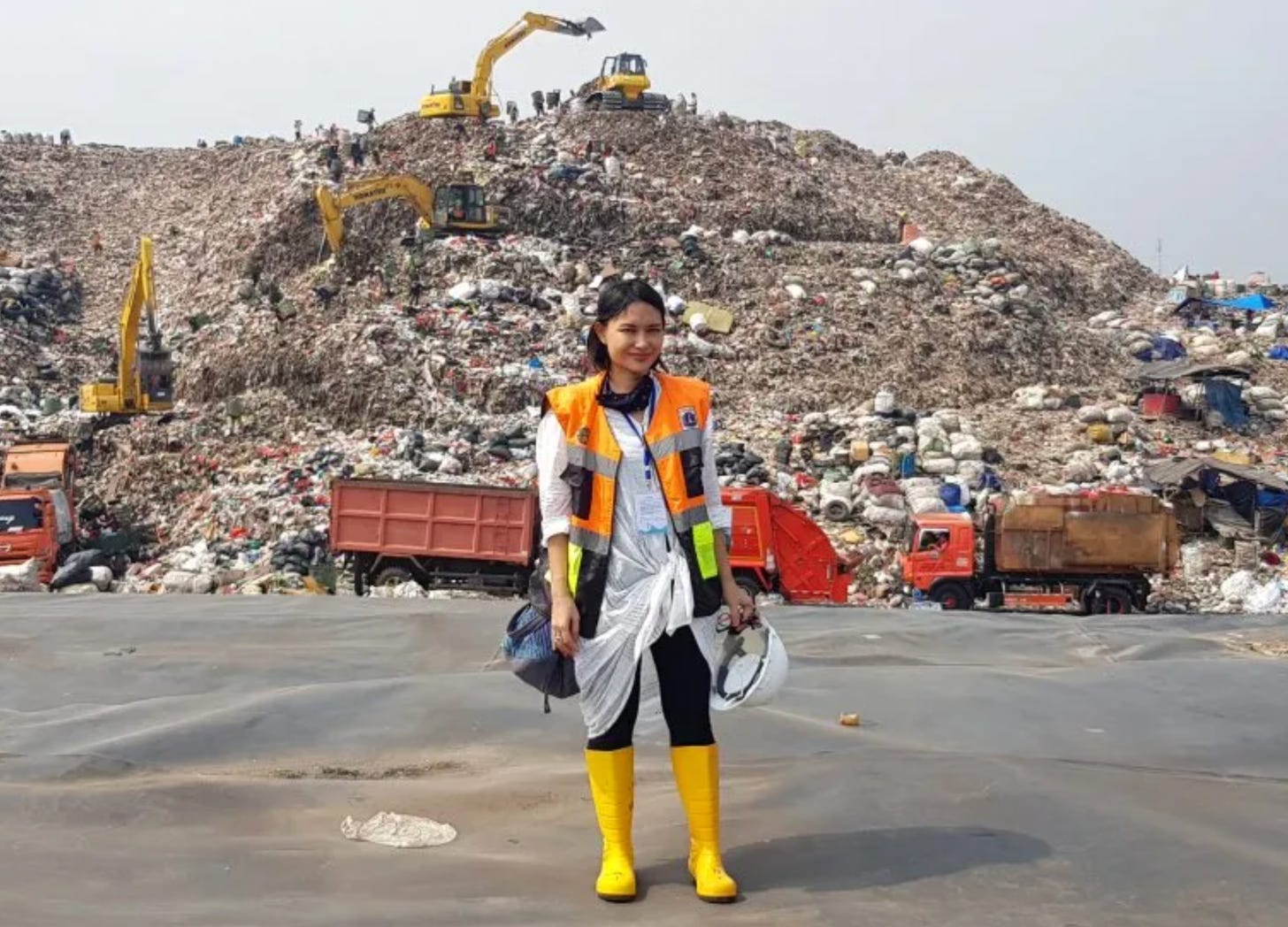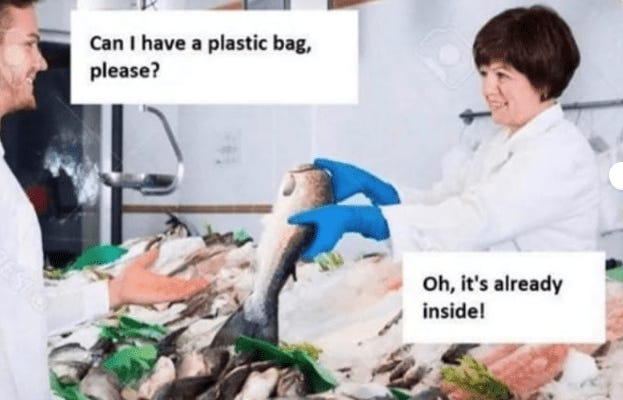“I want to be more radical, but I can’t”
Indonesian lawyer and activist Tiza Mafira on the frustrating expectation that she’ll silence her feelings in the name of professionalism
Psst. If you’re reading this week’s newsletter and wondering how you can transform your outrage, your grief, or your concern into small but tangible action that helps the world keep talking about the very real mental health impacts of the climate crisis, may we humbly offer one possibility: become a paid subscriber or if you prefer, support Gen Dread with a one-time donation through our partner, Small Change Fund. We want to keep the conversation going as much as you do, and we’d be so grateful for your help.
The persistent myth of “professionalism”
When Tiza Mafira was a kid, it wasn’t uncommon to go grab a ceramic bowl from the kitchen and fill it up with noodles from the food carts passing by your house. But today, Indonesia has a staggering plastic waste crisis: it’s second only to China in the amount of pollution it creates, and many of its major rivers are choked with garbage. In addition, other countries are using Indonesia as a dumping ground for their plastic waste, which is worsening the problem exponentially.
In 2013, Tiza founded Plasticdiet Indonesia, and she’s on a mission to change the country’s relationship with plastic. Thanks to her efforts, more and more local governments are enacting single-use plastic bag bans. But like many environmental activists, Tiza has big feelings of despair, anger, and sadness in doing this work.
In parts of the Global North, we’re starting to do a better job of closing up the chasm that exists between personal feelings and professional life. Increasingly, we’re recognizing the absurdity of existing within the climate crisis and somehow presenting yourself as neutral about it. We’ve made more space for the impact of this crisis on people’s mental and emotional health. And we’re starting to dismantle the harmful myth that being “professional” involves zero emotional response.
But as you’ll read in this conversation, the perception of professionalism in Indonesia’s environmental movement still doesn’t make much space for people’s feelings of eco-grief. As May is both Asian and Pacific Islander Heritage Month and Mental Health Awareness Month, we’re honored that Tiza was willing to bring her background and experiences to the forefront for us.
As someone who grew up in Indonesia, you’ve witnessed dramatic changes over the course of your life with respect to plastic pollution. What impact has this had on your mental health?
The issue with plastic is that it's so visceral, and it's so visual, right? You can see it, you can touch it. It's got substance in your hands. And when it pollutes rivers, you can really see it. When it pollutes coastlines and beaches, you can really see it. The places you go on holiday. When you think you're going to the beach to collect seashells, and you have memories from your childhood of going to the beach and collecting seashells, and then you go as an adult to the beach, but you don't find any seashells, you just find trash strewn everywhere. The impact is that it feels like there's no place to escape. It feels like there's no refuge from all of the environmental destruction that's happening around us, and yet people still manage to not see it. There’s this tension between what's so glaringly inescapable and what other people manage to just be completely apathetic to. That’s a really jarring feeling.
“We talk about it in private.”
Do you feel that mental health is a visible and understood issue within the Indonesian climate movement?
Not very much. I have heard a lot of discussion around mental health and anxiety within the Indonesian environmental activism community. But it isn't brought out into public discussion as much. I mean, we talk about it in private. And you hear things within our local community like, “I don't know if I want to have children” and “I don't know if we are making any difference in what we're doing” but it's not really publicly discussed – mental health is not seen as a prominent issue. Maybe it's considered a very niche problem, or that only the environmental groups have this problem. Maybe it’s seen as a problem that’s somehow different from all other mental health issues – it's treated as a separate problem. Here's mental health, here's climate anxiety. It's not one and the same.
In the absence of a more official mental health support system, are people in the movement taking care of each other?
It’s really just groups of friends and honest conversations over coffee. And usually outside of work. Because even when you're at work, you're doing environmental work and these are professional meetings. These are meetings to discuss, okay, what are the problems, and what are the solutions? These are not meetings to discuss your personal feelings. And a lot of the anxiety has to do with personal feelings. I'm doing this work. I know that I'm working towards a solution, and that's professional, but personally, I don't know if this is going to work. That's a very different thing. And that's rarely discussed. It rarely comes out.
How do you tend to those personal feelings and make space for them when your professional life doesn't really let you?
I've been journaling since I was a kid and I find that it helps me personally. I think we need to make space for a lot of stupid questions that we may not be willing to ask in a professional setting. What I mean by “stupid questions” is the obvious questions that are somehow not getting discussed. There's no safe space to ask them, and we don't always find the courage to talk about it. For example, less consumption. Just constantly saying, “we have to consume less, we have to consume less” doesn't really fly, actually, in policy settings. I work in a policy space. If I say “consume less”, well, the direct consequence of consuming less is that you have to produce less. And that's a killer. Nobody would take me seriously in a policy discussion if I say in front of government bureaucrats, “we actually have to cut our production.”
So that’s the kind of thing I end up ranting about in personal spaces and in my journals. Some of us try to speak on these kinds of issues in policy discussions and have been burnt for it and have not been taken seriously, have been branded as radical or not a serious policy wonk, so we have to tread carefully. And that's a lot of pent-up frustration, right? Mentally speaking, that's a lot.
Another example is the growth mindset, or the GDP mindset – these are talking points of very well intentioned environmentalists. Some very respectable institutions that we always work with are using taglines like “green growth”, well, how do we get to green growth, how do we get to decarbonized GDP growth?? And in my journals, I'm like, bullshit. There is no such thing. And I don't understand how to make it work. If you really think about it, if the only indication for growth is GDP and everything is in there, whether that's green or dirty or red or yellow, then how do you expect to get green growth? It's not possible.
And these are things that I find I cannot say. How can I say that to the several United Nations agencies that keep using those terminologies? I'm not singling out a particular organization, but all of the development institutions, and all of the development banks all use these indicators that I don't think are going to work. But I am using those indicators too, because I know that I'm speaking their language when I use them and that makes it easier for them to understand me. So that is also a lot of inner conflict. Like, it creates a lot of conflict personally for me. I think a lot of the mental anxiety that I feel stems from the fact that I want to be more radical, but I can't.
What do Indonesia’s environmental activists actually need?
How do you think people in the climate movement could best be supported? What kind of support would you like to see put in place?
I think a forum would be super-helpful, just to get people together and help them open up in a safe space about what they're feeling. I've never encountered or been invited to any such forum. I think it would be helpful to know whether other people are as worried as I am.
I get this question quite a lot from journalists: oh, are you optimistic or pessimistic? And I never really know the answer to that. I'm both, or neither. So I think we need to have a conversation about how we really feel. Because it's not black and white.
I work in plastics issues. We have been fighting for years against single-use plastic, and the fight has always been pushed back to us as “you need to educate the masses. If the consumers are aware, everything will shift.” And then we always push back and say, “no, we need policies, and the policies will educate the masses.” And it's always this tension. The policies are always slow. But consumer awareness is always patchy. And after years and years of working on it, whenever I'm out shopping or looking for food online or getting my food deliveries, and it's just plastic after plastic after plastic after plastic, it really hits hard. It feels like I'm a failure. And I really take it personally because I'm trying to always think systematically in my work. I'm always trying to think, change the system, not change the people. The system needs to change so that people will then find it easier to change their behavior.
When I watched Don't Look Up recently, there was a sentence right at the end where the character played by Jennifer Lawrence said, “I feel better knowing that we tried.” And that one sentence, I thought, okay, I can do that. I get that. I think I could use that from here on out. So I really try to make sure that I try my best. That's going to help me personally deal with whatever's happening. That's a good line.
If you liked reading this, feel free to click the ❤️ button on this post so more people can discover it on Substack 🙏🏼
We've got some big things brewing
In a survey we put out last year, so many of you told us that you deeply desired resources, tools, and programming beyond this newsletter. Which, frankly, is no surprise. In this moment of rising eco-anxiety, climate grief, and extreme weather traumas, of course we all need tools for coping and changemaking. So we mulled it over, got creative, and started imagining what that might look like, and next we're going to reveal what we've come up with. Stay tuned!
Making Waves
Listen to this enlightening episode of Someone Like You podcast with our founder Britt about her research and advocacy in the intersection of climate leadership, emotional well-being, and community resilience.
Don’t miss this week’s episode on Foodie Pharmacology with Britt about generational perspectives on climate anxiety, the importance of building resilience and hope through action, and the creation of ‘Unthinkable Earth’ - our nonprofit designed to support mental health in the face of climate challenges.
We're completely reader-supported and would be thankful if you'd consider becoming a paid subscriber or supporting us with a one-time donation through our partner, Small Change Fund. Thank you for being here 🙏🏼
‘Till next time!







That is a good line from Don’t Look Up Tiza. You are not a failure! Thank you for your candor, honesty, and vulnerability. I struggle mightily in development and waiting, waiting, waiting… for signed contracts on written proposals that shift from business as usual = 100’s of hours of education, research, getting out of my comfort zone, meeting folks, forming teams, forming relationships… and I’m exhausted and thinking nothing will ever change…
I fired off a 10-person professional email to associates in different backgrounds recently to discuss Gaia’s Web by Karen Bakker, The MIT Press, 2024. I found kindness, empathy and most importantly, support. They are points of light for me.
Maybe relationships are what matter most? Little by little. Maybe we all move forward?
With the help of dear writer friends, I’ve only recently begun to analyze capitalism (something I’d never really questioned critically) vs. degrowth. Per your policy discussions and GDP measurement/metrics, I’m so curious if you’ve read Less Is More – How Degrowth Will Save The World by Jason Hickel:
“There is now a fast-growing list of alternative metrics (to GDP), including the Index of Sustainable Economic Welfare and the Genuine Progress Indicator (GPI), both of which set out to correct GDP for social and ecological costs. And this new thinking is beginning to trickle into policy too. New Zealand’s Prime Minister Jacinda Ardern captured headlines in 2019 with her promise to abandon GDP growth as an objective in favour of well-being.” Pg 203
Tiza, do you hear GPI discussed in those rooms you are in? <Love that you are in those rooms> Or is GPI “one of those things” not taken seriously?
Sorry for the long post!
Thank you and kind regards